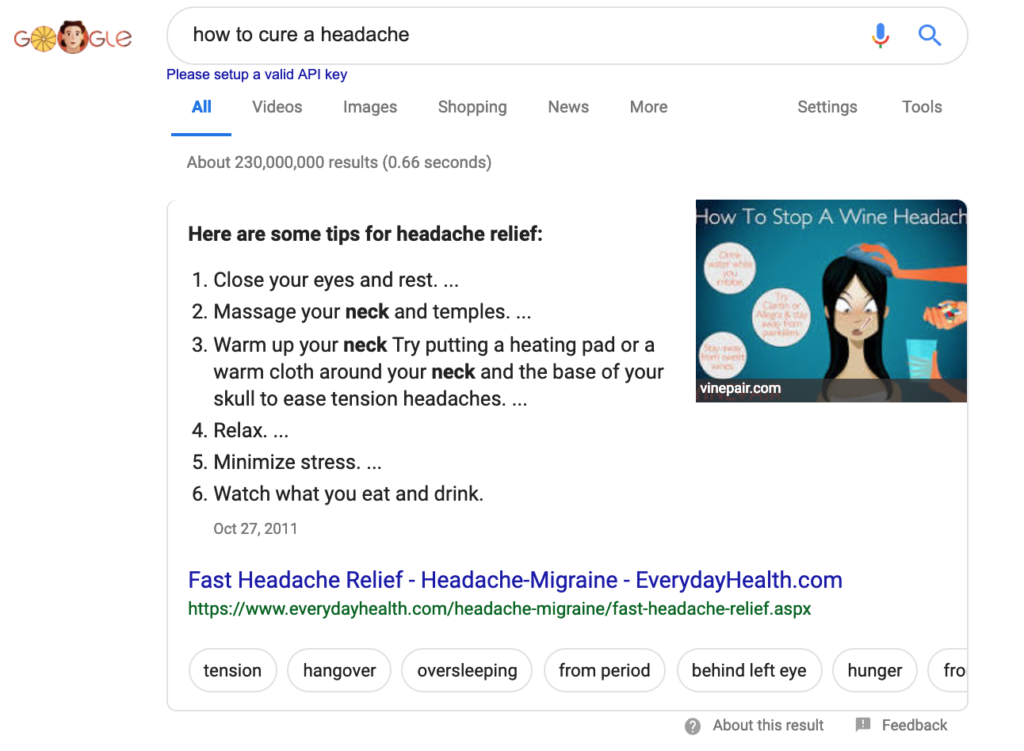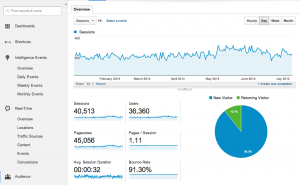
When it comes to organic search rankings, you have probably heard the phrase “Content is King”, and in our experience, publishing great content is the foundation to moving up in the SERPs. But as we have learned, it’s hard work!
The content you publish has to be well-written, interesting and authoritative. And it takes time and perseverance. The more you publish – and the better your articles are – the better the results will be.
While this article spells out the steps on how to improve your Google search rankings, and we highly recommend you read about all of them, here is a quick list of our recommendations:
- Create Good Content. And Then Create Some More!
- Use Effective blog titles
- Keep Your Content fresh!
- Write your articles using good “on-page” SEO techniques
- Add good Outbound Links in your articles
- Find and use good media
- Make Google’s Featured Snippets (Answer Boxes) Your Target
We have had a lot of success in improving our client’s Google organic search rankings and it all starts with creating good content. But attention to detail will also help your results.
Here are 6 great tips you should incorporate into your content creation strategy:
How to Improve Your Google Search Rankings – Tip #1 – Create good content, and then create some more!
We have previously written about the benefits of creating and sticking to an effective Content Calendar. The result should help you develop a winning strategy when it comes to winning in organic search! More specifically, it should put a system in place to define your writing team, layout a regular publishing timeline, and to produce articles that are interesting to your audience.
Just remember, more is better and there is no substitute for producing great content. Just make sure that your content has a purpose! Don’t waste your time publishing articles without specific intent. Define an organic search goal for every article.
How to Improve Your Google Search Rankings – Tip #2 – Use Effective blog titles
Make an effort to give your articles compelling, eye-catching titles. Some may refer to this as “click bait”, but so what!
Your goal is to get people to click on your articles when they appear in Google search and a good title like “Top 10 ways to Lose Weight” or “How to Avoid Drama in Your Marriage” will stand out!
How to Improve Your Google Search Rankings – Tip #3 – Keep it fresh!
Make it a point to revisit your content regularly. Remove outdated information and replace it with current ideas and new quotes.
Add outbound links to new articles that you find that expand on what you are writing. These links will often promote backlinks to your content from a grateful blogger!
How to Improve Your Google Search Rankings – Tip #4 – Focus on proven “on-page” SEO techniques
Once you have a great piece, use SEO best-practices to rank better in the search engines. We use WordPress as our blogging platform, and our go-to SEO tool is Yoast.
Using this great plugin, here are some of the steps we follow to optimize our on-page SEO:
- First, we plug in our target keyword and write a compelling title and description that contains that keyword (see the Snippet Preview in the Yoast section). These are the values you will see in your Google search result. Try to write an eye-catching title and an informative description. Remember, you are not just trying to rank high – you want people to visit your page!
- Next, divide your article into sections and use section titles that include your keyword. Assign H2, H3, H4 tags where appropriate. Don’t overstuff the keyword into your titles. Use it 3-4 times.
- Use bold and italic fonts to emphasize your keywords.
- Make sure you also include your keyword or variations of your keyword or phrase throughout the article. But, avoid overstuffing it into your text – – it’s better to use synonyms.
- When you think you are done with your post, Yoast will give you a grade (the green light is good!) and will list all of the on-page issues it finds. Address them one by one until you are comfortable.
The Yoast plugin takes care of the important metadata that Google looks for when indexing your page. As long as you set things up correctly, the plugin will place your Title and Description metadata in the search engine results.
Another good practice is to write a clear introduction to your article with a summary of what you are going to discuss at the top. As someone once
How to Improve Your Google Search Rankings – Tip #5 – Add good outbound links in your Text
Make sure to link to high-quality, authoritative websites throughout your articles. This will serve two purposes. First, it will help your audience learn more about your topic. Linking to other supporting information is like using good footnotes and your readers will appreciate it.
And Google will too!
Also, avoid using link text like “Click Here” and try to use descriptive text whenever possible. This will help the ranking of the page you are linking too and will be appreciated by the webmaster of the linked websites!
IMPORTANT: Remember to avoid using the same keyword you are trying to win in the outbound link text. You do not want to give someone else the edge up on your target keyword!
How to Improve Your Google Search Rankings – Tip #6 – Find and use good media
Interweave images (and if possible good video examples) throughout your article that
Not only does it look nicer to the reader, but good use of media will help tell the story.
And make sure to use proper alt tags (alternative text descriptions) on your media files. This is important when serving your content to an audience that uses text-only browsers or screen readers. And it’s an important step in making your website ADA compliant.
How to Improve Your Google Search Rankings – Tip #7 – Make Google’s Featured Snippets (or Answer Boxes) Your Target
This is a really important step and a goal worth striving towards!
People often use questions when performing a search, and Google will often place what they consider is the best answer at the top of the search results page (SERP).
Here’s an example:

You want this spot! Google calls it “position #0” and it appears above all other results. This valuable real estate will get you a lot more impressions and cliks.
It’s a hard spot to get, and a
Rand
Here’s another great article by Robbie Richards that also discusses this at length.
In short, depending on whether your article should show a paragraph snippet or a list snippet like the one above, you should add the appropriate summary section to the article near the top of the page.
According to Robbie Richards, “The easier you make it for Google to understand your content the more likely it is they’ll award you with a featured snippet. For that reason, choosing the right keyword is only half the battle. You should also include numbered and bulleted lists that summarize the key points or steps in a post.”
In Conclusion
There is no shortcut to dominating Google Search. It takes time, effort and some knowledge of what Google is looking at. Utilizing the techniques described above has gotten us great results for our clients, and we think it will help you too.




